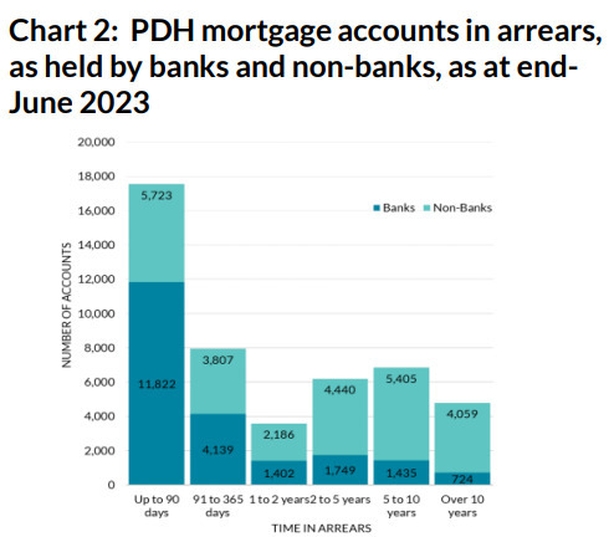The total number of mortgage accounts on principal private homes in arrears fell by 4% in the second three months of this year, according to the latest figures from the Central Bank.
However, on an annual basis, the numbers entering arrears of up to 90 days rose by 19%.
The Central Bank said that 46,891 mortgage accounts were in arrears, a decrease of 1,889 on the first quarter. Compared to the second quarter a year ago, the total number in arrears was up 232 or 0.5%.
The numbers in arrears up to 90 days fell by 1,930 or 9.9% in the second quarter compared to the first three months of the year.
However, on an annual basis, there were 2,852 more mortgages falling into arrears for up to 90 days. This represents an increase of 19%.
The numbers in arrears of over 90 days and up to a year also rose both on a quarterly and annual basis.
This was offset by a continued reduction in the numbers on long-term arrears. This is defined as arrears of over a year, which accounted for 46% of all accounts in arrears at the end of June.
5,886 accounts in arrears, or 13%, are in a legal process. 37% of this cohort have been in a legal process for over five years.
Non-banks, which include credit servicing firms, accounted for almost 114,000 or 16% of mortgage accounts in the second quarter.
18% of these accounts are in arrears of over 90 days while almost 16,000 or 14% are in arrears of over one year.
Just over 4,000 are in arrears for over 10 years.

A total of 61,708 mortgage accounts or 9% of all principal private home mortgage accounts are classified as "restructured".
The Central Bank said that 85% of these are "meeting the terms of their current restructure arrangement".
In the second quarter, a total of 14 properties were repossessed - 10 on foot of a court order and four voluntarily surrendered or abandoned.
Lenders held 262 principal dwelling homes at the end of June. Over the quarter, lenders disposed of 34 properties, today's figures show.
42 flights at Gatwick were cancelled or diverted and many more were delayed last night due to a staffing shortage in the control tower at the West Sussex airport.
Mitchell O'Brien, from the Insolvency Resolution Service, said today's Central Bank figures leave 17,545 families who were never in financial difficulty before in mortgage arrears and "dealing with very stressful issues."
Mr O'Brien said that while the reduction in very short-term arrears exceeds the number of the reduction of the overall arrears cases, the long-term arrears cases are actually up.
We need your consent to load this rte-player contentWe use rte-player to manage extra content that can set cookies on your device and collect data about your activity. Please review their details and accept them to load the content.Manage Preferences
"The real numbers here of relevance are that there are 17,545 families in short-term arrears of up to 90 days and those numbers in the next quarter are going to show that they're in longer-term arrears," he said.
Mr O'Brien said the "mainstream" banks - Bank of Ireland, Permanent TSB, AIB - have fixed rates offers, so people can budget to a particular monthly payment.
But the investment or "vulture funds" are resisting introducing fixed rates despite being called on by the Minister for Finance to do so.
He said this was a large contributing factor the increasing level of arrears.
He said the fact that these people's loans were sold to vulture funds in the first instance shows there was previous financial distress in the household.
"You move that along and you have to absorb 10 interest rate rises; some of these people are dealing with interest rates of eight, nine, and 10% at the moment, which is blatantly unsustainable," he stated.
He called on the Government to "further resource" personal insolvency practitioners, or PIPS.
He noted that IRS Ireland has experienced a 475% increase, year on year between 2022 and 2023, in relation to people reaching out looking for assistance.
"And if PIPS are going to be an instrument of government policy for resolving mortgage arrears for both borrowers and their mortgage lenders, we need help - there's no organisation in the country that can handle a 475% increase in demand for services without assistance," he added.






